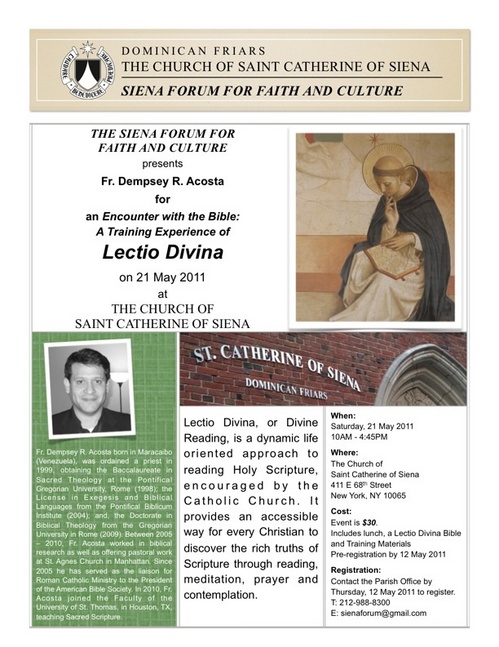Here are Pope Benedict’s 5 reasons for Christians doing lectio divina, because as he sees it, lectio is the new springtime of the Church.
Lectio Divina is of course central to Benedictine spirituality –but not limited to those who are “professional religious people– with several hours a day of prayerful reading of Scripture and other spiritual texts required of monks in the Rule.
And it is also one of the central themes of Pope Benedict XVI’s Apostolic Exhortation Verbum Domini. Scattered through the document are the reasons why lectio is so crucial. Here is my summation of the reasons he sets out for why we should do lectio divina.
1. To please God by listening to him. Pope quotes Origen: “Do your reading with the intent of believing in and pleasing God.”
2. To build the Church as a community. “While it is a word addressed to each of us personally, it is also a word which builds community, which builds the Church…The reading of the word of God… enables us to deepen our sense of belonging to the Church, and helps us to grow in familiarity with God.”
3. To nourish and sustain us ‘on our journey of penance and conversion’: through it, we grow in love and truth.
4. In order to discern God’s will for us, and convert us: “Contemplation aims at creating within us a truly wise and discerning vision of reality, as God sees it, and at forming within us “the mind of Christ” (1 Cor 2:16).
The Pope particularly recommends lectio divina to seminarians because: “It is in the light and strength of God’s word that one’s specific vocation can be discerned and appreciated, loved and followed, and one’s proper mission carried out…” Lay people to should be trained, he urges, “to discern God’s will through a familiarity with his word, read and studied in the Church under the guidance of her legitimate pastors.”
He goes on: “Saint Paul tells us: “Do not be conformed to this world, but be transformed by the renewal of your mind, that you may prove what is the will of God, what is good and acceptable and perfect ” (12:2). The word of God appears here as a criterion for discernment: it is “living and active, sharper than any two-edged sword, piercing to the division of soul and spirit, of joints and marrow, and discerning the thoughts and intentions of the heart” (Heb 4:12).”, and “….by nourishing the heart with thoughts of God, so that faith, as our response to the word, may become a new criterion for judging and evaluation persons and things, events and issues”….”
5. For the spiritual benefit of others. First, to equip us to fulfill the duty of all Christians to evangelize, contributing to the Churches mission to convert the whole world to Christ. And secondly to aid the souls in purgatory through the Church’s offer of indulgences for Scripture reading and certain Scripturally based prayers (such as the Office), which teach us that “to whatever degree we are united in Christ, we are united to one another, and the supernatural life of each one can be useful for the others.”
 Are you familiar (at the deepest possible level as able) with sacred Scripture? Daily, it is recommended, to spend time doing lectio divina.
Are you familiar (at the deepest possible level as able) with sacred Scripture? Daily, it is recommended, to spend time doing lectio divina.



